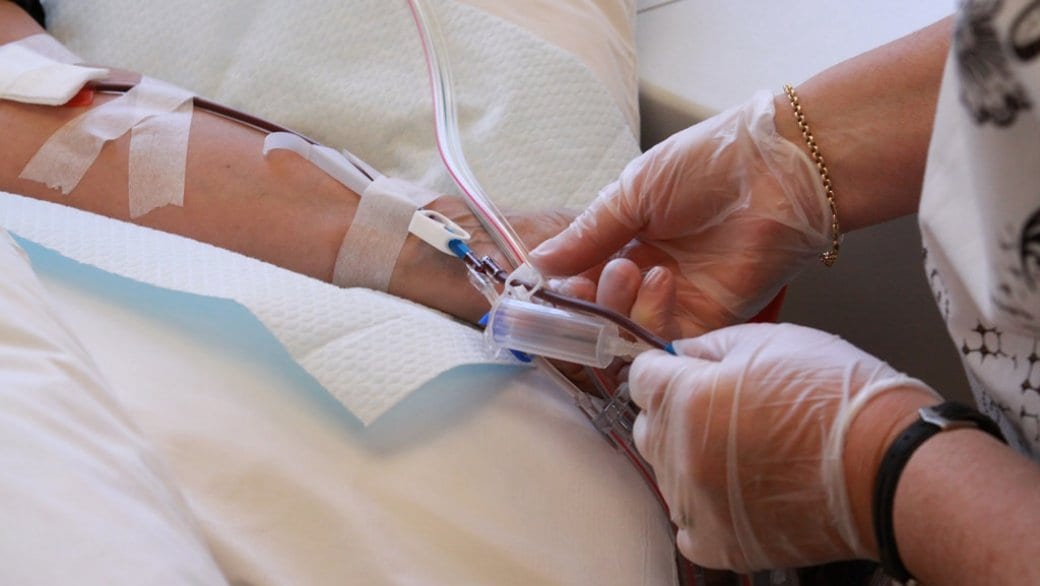Canada will likely lower its restrictions on gay and bisexual men donating blood this fall, following other Western countries. The federal government is also hinting it’s considering ending the ban entirely.
In an exclusive interview, Mindy Goldman, Canadian Blood Services’ medical director for donations, told Daily Xtra the agency formally asked Health Canada in late March to decrease the abstinence period for men who have sex with men (MSM) from five years to 12 months.
“If we get an approval — we’re certainly hopeful — then we would be implementing in the fall,” says Goldman, who expects a response from Health Canada in roughly three months, followed by a few months to change internal protocols.
Health Canada confirms it received Canadian Blood Services’ proposal on March 30, 2016, and a similar application from Héma-Québec (which runs Quebec’s blood services) on April 1.
“A regulatory decision from Health Canada is expected in the summer of 2016,” says Rebecca Gilman, a spokesperson for Health Canada.
Health Minister Jane Philpott hinted her government will aim to further reduce the one-year deferral period, after pledging in the 2015 federal election to end the ban entirely.
“The change in policy represents a step forward, but it is just the beginning. I know there is much further to go,” Philpott said April 14, 2016, in a written statement.
“Our government remains committed to eliminating the stigmatization of any group in blood donor screening, while ensuring the safety and quality of Canada’s blood supply.”
Since 2014, the Liberal party website has hosted a petition to “end the gay blood donation ban.” But the pledge did not show up in Prime Minister Justin Trudeau’s mandate letter to his health minister, and Philpott could not comment on the question when Daily Xtra asked in December 2015.
Goldman acknowledges some people want faster change, but stresses that Health Canada has been extremely cautious since the tainted-blood scandal infected roughly 2,000 Canadians with HIV in the early 1980s. That led to a total donation ban on men who have had sexual contact with men.
“I think some people who were not close to the issue . . . would like to move faster, and I totally get that. I understand that but I think they’re not really looking at the picture of the environment that we work in, and why changes happen in an incremental way,” Goldman says.
In May 2013, Health Canada created a deferral period where men could donate if they abstained from sexual contact with other men for five years, following other Western countries.
At the time, the department said any further changes would require two years of studying risks.
“All the evidence showed that [the five-year deferral] was safe: that we didn’t have any increase in people coming to donate who shouldn’t have been, or any increase in the number of people who are positive in our infectious-disease testing for HIV,” Goldman says.
Goldman adds that Canadian Blood Services submitted roughly 25 pages to Health Canada explaining why they now want a one-year deferral period. They pointed to a similar standard in the United Kingdom, Australia and Sweden, and noted the United States also shortened its deferral period in December 2015.
Goldman also says her agency doesn’t believe HIV cases are as common in gay men as studies suggest.
“We feel that the epidemiological studies done in the MSM population tend to skew towards the highest-risk individuals, in terms of HIV transmissions, because of the way people are recruited for these types of studies, and do not necessarily reflect the total MSM population in Canada.”
All blood collected in Canada is tested for HIV before it is introduced to the blood supply, and Canadian Blood Services estimates the risk of undetected HIV-positive blood entering its supply at one in eight million.

 Why you can trust Xtra
Why you can trust Xtra


